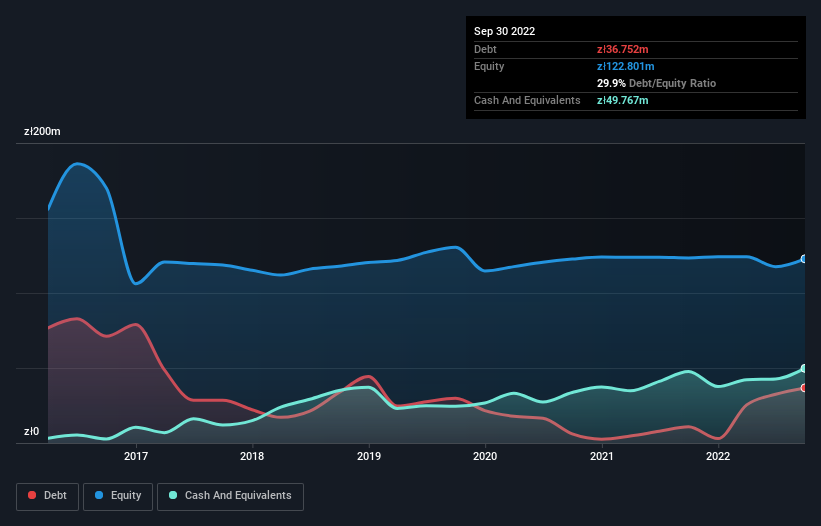
Some say volatility, rather than debt, is the best way to think about risk as an investor, but Warren Buffett famously said that 'Volatility is far from synonymous with risk.' When we think about how risky a company is, we always like to look at its use of debt, since debt overload can lead to ruin. Importantly, Zamet S.A. (WSE:ZMT) does carry debt. But is this debt a concern to shareholders?
When Is Debt Dangerous?
Debt assists a business until the business has trouble paying it off, either with new capital or with free cash flow. In the worst case scenario, a company can go bankrupt if it cannot pay its creditors. However, a more frequent (but still costly) occurrence is where a company must issue shares at bargain-basement prices, permanently diluting shareholders, just to shore up its balance sheet. Of course, plenty of companies use debt to fund growth, without any negative consequences. The first step when considering a company's debt levels is to consider its cash and debt together.
Check out our latest analysis for Zamet
What Is Zamet's Net Debt?
As you can see below, at the end of September 2022, Zamet had zł36.8m of debt, up from zł10.8m a year ago. Click the image for more detail. But it also has zł49.8m in cash to offset that, meaning it has zł13.0m net cash.

How Strong Is Zamet's Balance Sheet?
The latest balance sheet data shows that Zamet had liabilities of zł98.8m due within a year, and liabilities of zł18.3m falling due after that. Offsetting these obligations, it had cash of zł49.8m as well as receivables valued at zł103.4m due within 12 months. So it actually has zł36.1m more liquid assets than total liabilities.
This surplus liquidity suggests that Zamet's balance sheet could take a hit just as well as Homer Simpson's head can take a punch. On this view, lenders should feel as safe as the beloved of a black-belt karate master. Succinctly put, Zamet boasts net cash, so it's fair to say it does not have a heavy debt load!
We also note that Zamet improved its EBIT from a last year's loss to a positive zł299k. When analysing debt levels, the balance sheet is the obvious place to start. But it is Zamet's earnings that will influence how the balance sheet holds up in the future. So if you're keen to discover more about its earnings, it might be worth checking out this graph of its long term earnings trend.
Finally, while the tax-man may adore accounting profits, lenders only accept cold hard cash. While Zamet has net cash on its balance sheet, it's still worth taking a look at its ability to convert earnings before interest and tax (EBIT) to free cash flow, to help us understand how quickly it is building (or eroding) that cash balance. During the last year, Zamet burned a lot of cash. While investors are no doubt expecting a reversal of that situation in due course, it clearly does mean its use of debt is more risky.
Summing Up
While we empathize with investors who find debt concerning, you should keep in mind that Zamet has net cash of zł13.0m, as well as more liquid assets than liabilities. So we don't have any problem with Zamet's use of debt. There's no doubt that we learn most about debt from the balance sheet. However, not all investment risk resides within the balance sheet - far from it. Case in point: We've spotted 1 warning sign for Zamet you should be aware of.
Of course, if you're the type of investor who prefers buying stocks without the burden of debt, then don't hesitate to discover our exclusive list of net cash growth stocks, today.
Valuation is complex, but we're here to simplify it.
Discover if Zamet might be undervalued or overvalued with our detailed analysis, featuring fair value estimates, potential risks, dividends, insider trades, and its financial condition.
Access Free AnalysisHave feedback on this article? Concerned about the content? Get in touch with us directly. Alternatively, email editorial-team (at) simplywallst.com.
This article by Simply Wall St is general in nature. We provide commentary based on historical data and analyst forecasts only using an unbiased methodology and our articles are not intended to be financial advice. It does not constitute a recommendation to buy or sell any stock, and does not take account of your objectives, or your financial situation. We aim to bring you long-term focused analysis driven by fundamental data. Note that our analysis may not factor in the latest price-sensitive company announcements or qualitative material. Simply Wall St has no position in any stocks mentioned.
About WSE:ZMT
Zamet
Manufactures and sells industrial steel structures, machinery, and equipment in Poland and internationally.
Flawless balance sheet with solid track record.
Market Insights
Community Narratives



